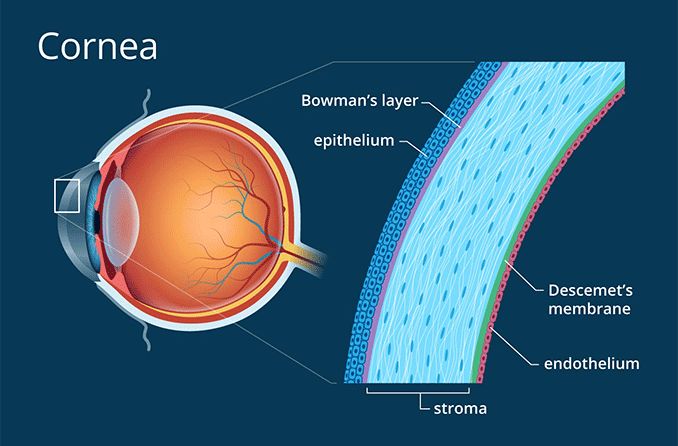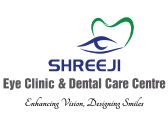- Shreeji Eye Clinic & Dental Care Centre
- Shreejiclinic2010@gmail.com
- +91 99203 92108
- +91 93246 36580
Cornea surgery
Home > Cornea surgery

We Are The Leading Eye Clinic
That’s great to hear! As the leading eye clinic, you must be dedicated to providing top-quality eye care services and treatments to your patients.
Cornea surgery
Cornea is the outermost black portion of an eye. it’s a transparent round structure of an eye responsible for focussing light rays inside the eyes. any damage or injury to this delicate structure can lead to opacification or haziness leading to blindness.
Causes of Corneal disorders
- Keratoconus
- Pterygium
- Infective Keratitis or corneal ulcer
- Corneal dystrophy
- Corneal tears
- Contact lens induced keratitis
- Allergic Keratoconjunctivitis
- Malnutrition Vitamin A deficiency
Keratoconus
It is a progressive disease of outermost layer of eyeball i.e cornea wherein there is gradual thinning of cornea causing it to bend and bulge forward n become conical in shape
This change in shape of cornea from spherical round to conical leads to formation of distorted image and blurred vision
It is generally seen in teenagers but can present in childhood or even adulthood.
It affects both eyes, one eye may be more affected than other.
Signs and Symptoms of Keratoconus
- Blurring of Vision, increasing myopia, high astigmatism,
- Frequent change in glasses
- Glare or increased sensitivity to light
How to diagnose?
Keratoconus can be diagnosed in early stage with detailed eye examination using Slit lamp and Retinoscopy
At Shreeji Eye Clinic, we are equipped with the most advanced n latest machine from Carl Zeiss,Germany to perform Corneal Topography test which checks the shape n curvature of cornea and help in further treatment of keratoconus
Other tests like Pachymetry is also performed at our Clinic to determine the thickness of cornea for Keratoconus treatment using ultrasonic or Optical Pachymeter.
What causes Keratoconus?
Exact cause of Keratoconus is not known but research suggests it may be due to imbalance in enzymes in corneal tissue.
Genetic predisposition is seen in some cases. Other factors like excessive rubbing of eyes, allergic conjunctivitis, improperly fitted contact lens have been associated with Keratoconus.
Treatment of Keratoconus
In early stages, Corrective prescription of glasses or soft contact lens can help.
But as Keratoconus advances, glasses may not help n use of special contact lenses are recommended of vision improvement like
- RGP (Rigid Gas Permeable) lenses
- Hybrid Contact lenses
- Rose K lenses
- Soft Scleral lenses
Newer treatment in Keratoconus
C3-R (Corneal Collagen Crosslinking)
It’s a minimally invasive treatment of Keratoconus which slows down or stop the keratoconus from progressing further. In this Riboflavin drops are applied on cornea and then activated by Ultra violet light which causes collagen cross linking and strengthen or stiffen the thin corneal tissue and thereby stop the bulging of cornea outwards.
INTACS (Intracorneal Ring Segments)
These are the special arc shaped implants inserted in cornea in Keratoconic eyes which significantly flatten the corneal curvature n improves vision
Keratoplasty (Corneal Transplantation)
When all above methods do not help patients to get improved vision, cornea transplantation is advised wherein in the affected cornea in keratoconic eye is replaced with donor cornea from another person.
Different Types of Cornea Transplantation includes
- Full thickness Penetrating Keratoplasty
- DALK (Deep Anterior Lamellar Keratoplasty)
- DSAEK (Descemet Stripping Endothelial Keratoplasty)
- DMEK ( Descemets Membrane Endothelial Keratoplasty )
Pterygium
Pterygium is a reddish or pinkish mass lesion that occurs on white exposed part of the eye. It slowly grows over the black portion of the eye i.e. cornea and can induce high cylindrical power and obstruct the vision.
Symptoms
Pterygium can cause burning, itching, gritty sensation, recurrent redness or blur vision
What causes Pterygium
Exact cause is not known but certain risk factors have been associated like prolonged exposure to sun light UV rays, outdoor field work, dry eyes, dust n wind etc.
Treatment of Pterygium
Pterygium does not respond to any medical treatment or eye drops. Surgery is the only treatment option.
Pterygium can affect vision n also sometimes cosmetically disfiguring, so early surgical excision is recommended.
At Shreeji Eye Clinic, we offer the latest in Pterygium Surgery with Conjunctival autograft technique with fibrin glue which is sutureless.
This surgical technique has shown to give the best results in pterygium surgery n is cosmetically very rewarding with hardly any recurrence rate as compared to older techniques.
It’s a one-hour day care procedure n fast recovery.

Emergency Cases
Call on this number
+91 99203 92108
+91 93246 36580

Dr. Kamlesh Gupta
MBBS, MD - Ophthalmology Ophthalmologist/ Eye Surgeon 20 Years Experience Overall (13 years as specialist)

Opening Hours
- Monday - Friday
- Saturday
- Sunday
- 24 Hours
- 08.00 - 22.00
- 10.00 - 17.00
Shreeji Eye Clinic & Dental Care Centre
Flat No 102, B -68 BLDG
Moreshwar Shantinagar CHS Ltd,Sector No.1 Opp. TMT Bus Stop
Near Rly Station, Shanti Nagar,
Mira Road, Thane,
Maharashtra 401107
